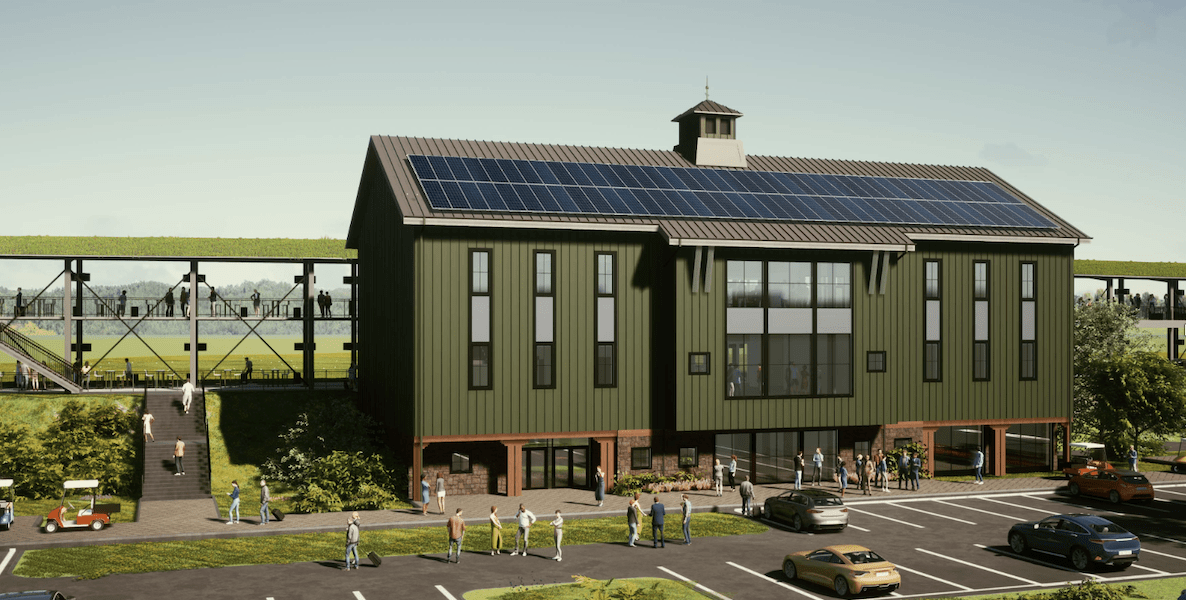Andrew Downs and his friends grew up playing golf at the historic Cobbs Creek Golf Course in the 1990s, navigating the unhoused individuals taking shelter there and feeling their shoes sink into the water-logged greens. No one in his family played golf, but a family friend who coached the sport encouraged his participation.
“We had a lot of fun there,” Downs recalls, “so many cool memories, like the syrupy Coke in the clubhouse that always tasted so good on a hot day. We didn’t know any better.”
Downs went on to caddie for golfers at Merion Golf Club in Haverford, which “was hard work, good work,” and helped him develop soft skills, including keeping the peace between couples golfing together. He also picked up lessons from the business people who made deals between holes. “You couldn’t help but develop skills because you worked with so many different people,” he says.
That experience led to securing a J. Wood Platt Caddie Scholarship, which provides financial aid to qualified caddies and others in golf operations who seek higher education. Downs became one of the first members of his family to attend college, graduating from the University of Richmond. Now, he’s director of education for the Platt Caddie Scholarship Trust.
“I’m average as a player,” Downs says. “But golf has given me a lot of opportunities.”
Cobbs Creek Golf Course shut down for good in 2020, after years of it and the surrounding Cobbs Creek Park falling into disrepair. Now, a group of Main Line philanthropists, along with Tiger Woods, are on the verge of bringing it back — and then some.
The nonprofit Cobbs Creek Foundation has begun the costly and challenging task of restoring the Cobbs Creek Golf Course. A state-of-the-art, two-story driving range and a nine-hole short course open to players early next year. An 18-hole PGA-level course will be finished by 2026. The course will have tiered pricing for local residents, reduced costs and support for young players, and create about 130 jobs.
“It’s a challenging game. It requires focus, dedication and practice and encourages respect. You don’t always get the bounces you want in life: How are you going to react? How are you going to come up with a different plan and try to execute it?” — Mark Peterson, executive director of the Golf Association of Philadelphia
Alongside the course and its facilities will be the TGR Learning Lab Philadelphia, a new 30,000-square foot facility that will offer year-round programming including STEM (science, technology, engineering and math)-focused courses, after-school and summer programs, and career and college preparation. Funded by Tiger Woods’ nonprofit TGR Foundation, it will officially open in early 2025, though programming has already begun. Last summer, TGR tapped longtime local school principal Merdith Foote to run the lab.
Together, the course and the learning lab are working to increase opportunities for underserved Philadelphians, with an eye to creating access to the middle class for Black families through tech education, sports and leadership development. The lab is taking its cues from the well-established TGR Learning Lab in Anaheim, where 98 percent of participants have finished high school and gone on to college. About 90 percent of those students are the first in their generation to pursue higher education.
The golf course will operate as a nonprofit, with proceeds going to educational programming. While the Learning Lab is being constructed next to a golf course and surrounded by golf-related programming, its opportunities and classes are open to all — even golf haters.
“This is about students and education and exploring their passions,” says Mallory Berger, senior director of development for the Tiger Woods Foundation in Philadelphia. “It’s about students pursuing careers and pursuing post-secondary journeys. If they happen to like golf, that’s amazing because it’s located here. But you don’t have to care about golf to be a student with the Learning Lab.”
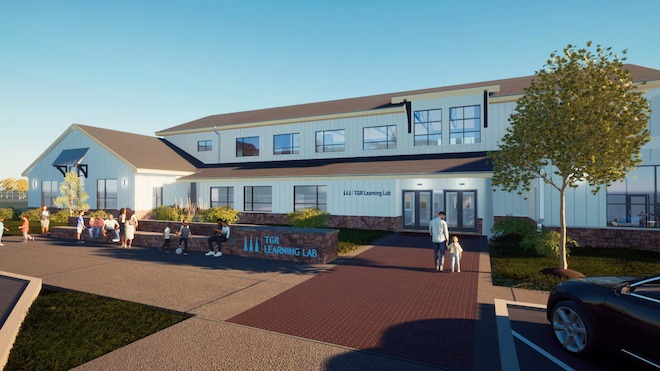
The “grandfather” Tiger Woods never had
Cobbs Creek Park may have spent the last decade in disarray, but its history is among the most storied — and equitable — in the sport of golf. Opened in 1916, Cobbs Creek Golf Club Course was nationally known for being open to every individual from the start. It was one of the few public courses in the country that welcomed players of all races and ethnicities, and even women.
Charlie Sifford, the so-called “Jackie Robinson of golf,” honed his skills here. In 1961, Sifford was the first Black player allowed to join the PGA tour. He became the first Black man in the World Golf Hall of Fame in 2004.
In his 1992 autobiography Just Let Me Play, Sifford describes moving from North Carolina to Philadelphia as a teenager and discovering Cobbs Creek. “The course was intended for everyone to use, and I was both surprised and delighted to see both Blacks and Whites playing side-by-side there,” Sifford wrote. “I’d never seen anything like that …”
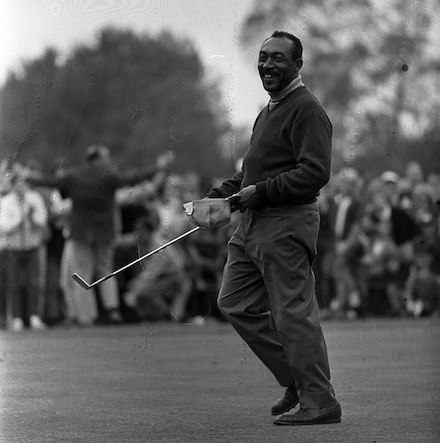
Sifford introduced other young Black men to the sport, including Earl Woods, father of Tiger Woods. Tiger Woods called Sifford “the grandfather I never had” and even named his son Charlie after the golf pioneer. (Charlie Woods, now 15, is also a golfer. He recently won the South Florida Junior Cup.) Sifford died in 2015 at age 92.
The course peaked in the mid-1950s, when a young Arnold Palmer played in the 1955 and 1956 Philadelphia Daily News Opens. A few years later, the U.S. Army took possession of some of the course for anti-aircraft equipment, forcing golf course leadership to reroute multiple holes.
By the turn of the millennium, the course at Cobbs Creek was showing signs of its age, with many problems traced back to the creek that flooded not only the course but spilled into surrounding neighborhoods. Reports of after-hours crime grew, including the sexual assault of two women in separate incidents in 2015. In 2016, a fire destroyed the course’s clubhouse. The property had become a dumping ground for everything from rusted cars to household furniture to construction waste. The course closed in October 2020 when the contract between the city and the company managing the course ended.
While restoring the original course has been talked about for years, the idea began picking up speed when local golfers Mike Cirba and Joe Bausch founded Friends of Cobbs Creek Golf Course in 2008 and self-published Cobbs Creek Golf Course: Uncovering a Treasure in 2009. Cirba and Bausch then shared the park’s history with others and began advocating for the course’s restoration. In 2017, Jim Maguire of the philanthropic Maguire Foundation and commercial real estate broker Chris Lange founded the Cobbs Creek Restoration and Community Foundation to support “golf with a mission.”
In 2022, the nonprofit signed a 30-year lease paying the city $1 for the right to restore and run the course with revenue going towards educational and community programming and scholarships. Today, the foundation says the project’s total cost is $150 million, which includes at least $20 million for creek mediation and wetlands expansion, as well as clearing the property of dead trees, household trash, construction waste and other illegally dumped items, and replacing the clubhouse.
Today, they’ve raised about half of those funds. (Earlier this month, the National Fish and Wildlife Foundation and the U.S. Fish and Wildlife Service announced a $1.08 million grant for two Cobbs Creek environmental projects.) The Foundation is now actively seeking additional private and corporate donors and hosting fundraisers like the inaugural “Kids for Cobbs” event held in mid-August at Newtown Square’s Aronimink Golf Course. The idea for the event, which brought in more than $30,000, came from a high school junior who volunteers with the Foundation.
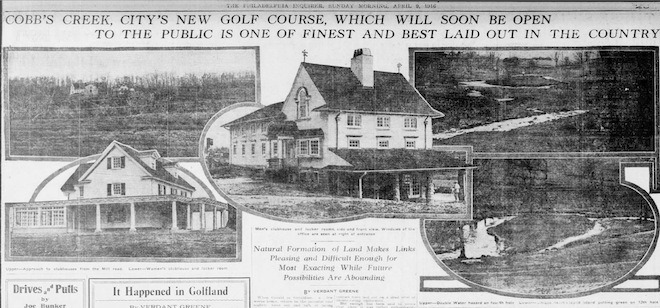
Golf is on the upswing
The project is happening at a time when the world of golf is becoming increasingly diverse: While the overall popularity of the sport declined over the past decade, the industry group the National Golf Foundation reports 26.6 million people played on-course golf in 2023, an increase of 2.4 million players from 2022. The average age of those participants was lower than the previous year — and included an uptick in female players and players of color. The number of Asian, Black and Hispanic golfers has increased by 43 percent since 2018, and there’s been a 40 percent increase in the number of junior players.
Local golf numbers, too, show the sport’s growing popularity. The city’s three operational public golf courses — Walnut Lane, John F. Byrne and Juniata — have also been growing in popularity, says Mark Peterson, executive director of the Golf Association of Philadelphia (GAP), a nonprofit that has promoted the game locally for more than 100 years.
Using the Walnut Lane course as an example, Peterson noted growth in terms of “rounds,” meaning the number of people who pay a fee and play 9 to 18 holes. In 2016, Walnut Lane tallied 17,000 rounds. In 2023, that figure had further jumped to 40,000.
“I’m anticipating a waitlist because this will be a safe, inspiring, joyful place where the opportunities are endless.” — TGR Learning Lab’s Meredith Foote
Youth-focused golf programs are also growing, including First Tee of Greater Philadelphia. Other people are being introduced to the game via off-course entertainment venues including TopGolf and Five Iron Golf, Peterson notes. Organizations like GAP also have programs that aim to make golf accessible to young players at all income levels, says Peterson.
Like similar organizations in other sports — Philadelphia Youth Basketball, for example — TGR uses golf as a means to an end. Unlike basketball, though, it’s not a sport casually picked up for most, and doesn’t have the same baggage: You’re unlikely to find many city kids claiming they’re going to be the next Tiger Woods, as opposed to those claiming they can go pro in the NBA. Golf teaches life skills and is still the sport of business — learning to play can open the door to career advancement.
“It’s a challenging game. Sometimes you’re good, sometimes you’re not. It requires focus, dedication and practice and encourages respect,” Peterson says. “You don’t always get the bounces you want in life: How are you going to react? How are you going to come up with a different plan and try to execute it?”
It’s been a long, arduous process
As with any major project, this one has had its detractors.
The most vocal group has been environmentalists, neighbors and longtime park users who say the park’s overgrown vegetation had been home to many plants and animals, and removing hundreds of trees in 2022 had displaced the animals, taken away thriving greenery and adversely affected the look of the landscape. As WHYY reported at the time, “nearly all trees had been cut down between Indian Creek, Cardington Road, and a section of Cobbs Creek near the center of the property, many right along the waterways.”
A 2022 article in Grid magazine further took the project to task, noting it removed a “century-old forest” to develop space for a game that was too costly a hobby for the families who lived closest to it. Others have complained the project isn’t upholding recommended environmental standards or taking flooding issues into account.
Julia Dignam, the foundation’s director of development and communications, says many of the removed trees were diseased and unstable or contributing to the erosion of the creek. Others were taken out to create better flood control, including 25 acres of wetlands. Years of poor management had also allowed invasive plant species to thrive.
The foundation has a replanting plan that includes a partnership with the city’s Parks and Recreation Departments’ TreePhilly program committed to recreating the tree canopy by planting 750 trees. The creek restoration project is critical to the larger development’s overall success and Dingman says the foundation is working with city, state and federal agencies — including the Environmental Protection Agency and the Army Corps of Engineers — to meet the most up-to-date ecological standards for the work.
It’s easy to be skeptical of the talk. After all, it’s been more than a decade since newspaper headlines have promised that Cobbs Creek Golf Course’s return to glory was imminent. So what’s different now?
- Work is actually being done this time, not just being talked about. Architects have been retained. Construction workers are busy onsite. Visitors can see the TGR Learning Lab literally rise from the ground up.
- Tiger Woods’ involvement in the park has made it a high profile project, bringing in new supporters, including three-time major winner Jordan Spieth. In July, the Cobbs Creek Foundation announced that the Jordan Spieth Family Foundation will fully fund a $250,000, 20,000-square foot putting green.
- There’s a synergy between the two nonprofits committed to the park that’s palpable even in the cramped onsite trailers where they’re currently based. Both organizations are trying to build deeper relationships with surrounding communities by offering young people internships and volunteer opportunities. Outreach is ongoing and new partnerships, including one with Nike, continue to be announced.
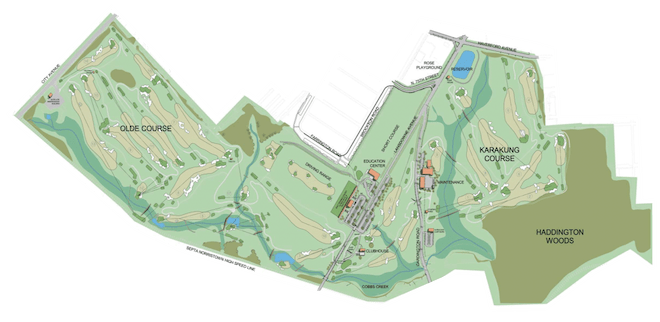
Golf + STEM = opportunities
The TGR Learning Lab is taking its cues from the first Learning Lab in Anaheim while making Philadelphia-specific adjustments. Since opening its doors in 2006, the Anaheim flagship has worked with more than 190,000 young people. Both labs have the same three prong focus: STEAM (science, technology, engineering, art and math) education and enrichment; health and well-being; and college and career preparedness.
The Lab supplements what is often lackluster STEM training Philadelphia students receive in public schools, particularly low-performing ones. STEM literacy is vital to future job success, with the U.S. Department of Labor projecting that STEM-related jobs will grow by 10.8 percent by 2032. (By comparison, it found that non-STEM jobs will grow by 2.3 percent in the same time.) The Biden administration has committed to a program called Raise the Bar: STEM Excellence for All Students. The initiative is part of 2018’s STEM Education Strategic Plan, a “call to action” that aims to make the U.S. “the global leader in STEM literacy, innovation, and employment.”
Under former school principal Foote, programming at TGR has already begun. In 2023, the Cobbs Creek Foundation launched a free, full-day educational “Academic Bridge” camp to local children referred by teachers. TGR Foundation’s summer 2024 offerings included week-long learning programs on subjects including robotics, photography, game design and digital art. Also this year, for the first time, five Philadelphia students have been chosen as Earl Woods Scholars. In addition to financial support, the program matches participants with mentors who will support them during their undergraduate years.
Recruiting students to participate should not be hard: There are 10 K-to-8 schools within a mile of the site, and 19 high schools within two miles of the future building.
“We’re making sure school leaders and caregivers and students know: This is for you. [It’s about] improving the trajectory of kids’ lives for generations to come,” Foote says. “The kids are super motivated and there’s so much more out there for them to explore. I’m anticipating a waitlist because this will be a safe, inspiring, joyful place where the opportunities are endless.”
Correction: A previous version of this post misspelled Julia Dignam’s surname.
![]() MORE ON IMPROVING KIDS LIVES WITH SPORTS
MORE ON IMPROVING KIDS LIVES WITH SPORTS



